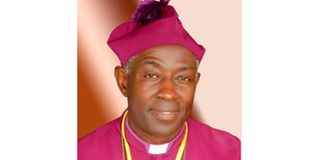Cleric asks Church to tackle cultures perpetuating GBV in Africa

Archbishop of the Church of Uganda Stephen Kaziimba, has challenged churches in Africa to actively participate in ending GBV.
What you need to know:
- Archbishop of the Church of Uganda Stephen Kaziimba, says most African cultures, regrettably, believe men are better than women, which has played a major role in enhancing GBV.
- He has challenged the churches to amplify the role of men as allies in advocacy to end violence against women, by having male champions pushing for gender justice.
African church leaders have been challenged to tackle existing attitudes, cultures and practices that continue to perpetuate gender-based violence (GBV) in the continent.
The Archbishop of the Church of Uganda Stephen Kaziimba, on Thursday said most African cultures, regrettably, believe men are better than women, which has played a major role in enhancing GBV.
He challenged the churches in the continent to embrace unique contributions to ending the GBV menace.
‘It is sad that we live in a fallen world where some of our cultures protect the abusers while others blame the victims. These days, police can be bought off by family members of the abuser and ‘lose’ the police file, so justice is not pursued," Bishop Kaziimba said.
Pass exams
The bishop noted that it is also disheartening to see young girls being forced into a sexual relationship with their teachers just to pass exams, women being harassed in the workplace and told to keep quiet about it if they want to be promoted, and boys sexually harassed and sodomised.
The cleric spoke during the launch of the 16 Days of Activism by the All African Conference of Churches (AACC) and its partners in Nairobi.
The function was attended by clergy and gender activists from across the continent.
He challenged the churches to amplify the role of men as allies in advocacy to end violence against women, by having male champions pushing for gender justice.
According to the cleric, it is critical that the society starts preparing boys so that they become responsible men who can protect women.
AACC General Secretary Dr Fidon Mwombeki, described GBV as a “stain on humanity” that needs to be addressed urgently.
Cultures and traditions
He regretted that there are still some cultures and traditions that see violence against women and children as okay.
AACC Director of Gender and Women Dr Lydia Mwaniki, said Covid-19 led to increased cases of violence against children, women and girls due to lockdowns that were imposed by the government to curb the spread of the virus.
“Church leaders must take it upon themselves to do much more to fight GBV. There is currently not enough preaching on this matter from church leaders. Clerics need to boldly speak out against this menace,” she said.
The churches seek to use the campaign to amplify men’s role as allies in advocacy to end violence against women and girls in Africa, by showcasing interventions by AACC Male Champions for Gender Justice.
Among the envisioned outcomes of the churches’ campaign include increased awareness and commitment to address sexual and gender based violence (SGBV) in the continent.
Faith actors
The clerics also seek to enhance collaboration among faith actors and networks to increase SGBV interventions, especially in the Covid-19 context. They are also pushing for increased media coverage of SGBV in the continent.
The 16 Days of Activism Against Gender-Based Violence is an international campaign to challenge violence against women and girls.
The campaign runs every year from November 25 to December 10. It was initiated by the first Women's Global Leadership Institute, held by the Centre for Women's Global Leadership (CWGL) at Rutgers University in 1991.
This year’s global campaign theme is: “Orange the World: End Violence Against Women Now’. As in previous years, the colour orange will be used to represent a brighter future, free from violence against women and girls.





